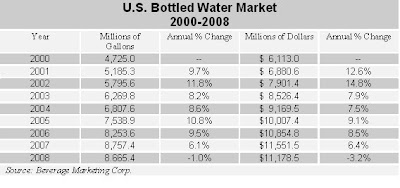But surely another reasons is that many states require deposits on other beverages, but not on bottled water. Well, that trend is changing. Eleven states have enacted bottle bills, requiring mandatory deposits on sodas, juices and other bottled beverages. In many places, bottled water has been exempt from those deposits.
According to Consumer Reports, by the end of this year, six states will require deposits on water bottles. They are Oregon, Hawaii, California, Maine, Connecticut and New York.
New York's deposit program, originally set to begin in June, should take effect this fall. And Connecticut's goes into effect Oct. 1.
In New York and Connecticut, consumers will be required by pay a 5 cent deposit on every bottle of water purchase, refundable when the empty bottles are returned to the store.
The bottled water companies and the International Bottled Water Association aren't happy with these new laws because it increases the cost of their product at a time when bottled water sales are already spiraling downward, as consumers become more aware of the economic and environmental costs.

For instance, in response to the Connecticut bottle bill, the IBWA argued that requiring deposits will hurt curbside recycling efforts in the state:
By enacting this bill, the Legislature has created a disincentive for curbside recycling efforts in Connecticut. The new deposit will give consumers a financial incentive not to put their empty bottles into curbside recycle bins. Instead they will now haul a larger percentage of their own trash back to the store instead of relying on the convenience, ease and simplicity of curbside recycling programs. Plus, they are forced to pay more upfront at the point of purchase. While a refund is possible, it requires far more effort on the part of busy consumers.But that's really a specious argument. It assumes that "busy consumers" already are recycling that empty water bottles. But the 12 percent recycling rate for water bottles clearly indicates they are now. What's more, statistics show that mandatory deposits actually improve recycling rates.
The Associated Press reports that in New York:
Earlier state laws required deposits on soda and other carbonated beverages, beer, and wine coolers, with a study showing they raised aluminum can recycling from less than 20 percent to more than 80 percent.





No comments:
Post a Comment